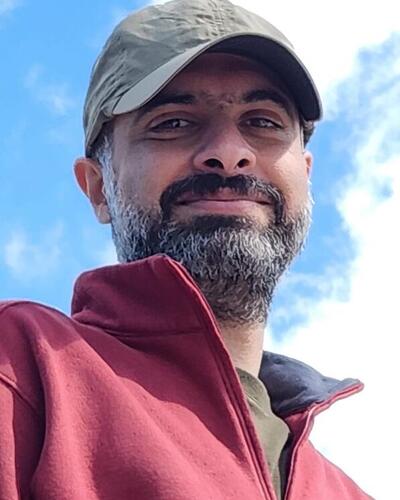- E-mailsaeed.langarudi@uib.no
- Phone+47 55 58 30 79
- Visitor AddressFosswinckels gate 6Lauritz Meltzers hus5007 Bergen
- Postal AddressPostboks 78025020 Bergen
We, humans, extract natural resources to produce goods and services that presumably improve our quality of life. Our extraction activities, however, could degrade the environment and have unforeseen impacts on the ecological systems that we live in. In the long run, our well-intended actions (extraction) might have unintended consequences for us and other living beings. As animals who think and reason, it is our responsibility to study and understand how our decision-making and interventions affect our socioecological systems.
In my research, I use system dynamics, development economics, and other social theories to understand how the processes involved in the natural resource extraction decisions shape the dynamics of social, economic, political, and ecological systems. The knowledge gained can help us re-engineer these processes to minimize the unintended consequences of our decisions and actions.
- (2024). What is (quantitative) system dynamics modeling? Defining characteristics and the opportunities they create. System Dynamics Review.
- (2024). Understanding Hydrologic, Human, and Climate System Feedback Loops: Results of a Participatory Modeling Workshop. Water.
- (2024). Uncovering the unknown with REMODEAL: A systematic method for reference mode elicitation. System Dynamics Review.
- (2024). Participatory system dynamics modeling for groundwater resources management (Case study: Marand Plain, Iran). Water and Soil Management and Modeling. 262-284.
- (2023). Never the strongest: reconciling the four schools of thought in system dynamics in the debate on quality. System Dynamics Review.
- (2022). Conceptual Framework for Modeling Dynamic Complexities in Produced Water Management. Water.
- (2021). System Dynamics Modeling for Evaluating Regional Hydrologic and Economic Effects of Irrigation Efficiency Policy. Hydrology. 20 pages.
- (2021). Modeling as a Tool for Transboundary Aquifer Assessment Prioritization. Water. 16 pages.
- (2021). Measure more or report faster? Effect of information perception on management of commons. System Dynamics Review. 72-92.
- (2021). Integrated Policy Solutions for Water Scarcity in Agricultural Communities of the American Southwest. Systems. 19 pages.
- (2021). A Literature Review of Hybrid System Dynamics and Agent-Based Modeling in a Produced Water Management Context. Modelling. 224-239.
- (2020). Tragedy of the Commons in Using Groundwater Resources in Agriculture Sector (Case Study: Iran). Journal of Strategic Management Studies. 77-98.
- (2020). Revisiting the Natural Resource Curse Hypothesis Using Dynamic Simulation. Journal of Economics and Modeling. 55-89.
- (2019). Simulating a Watershed-Scale Strategy to Mitigate Drought, Flooding, and Sediment Transport in Drylands. Systems. 33 pages.
- (2019). Does Socioeconomic Feedback Matter for Water Models? Ecological Economics. 35-45.
- (2019). A Dynamic Hydro-Socio-Technical Policy Analysis of Transboundary Desalination Development. Journal of Environmental Accounting and Management. 87-114.
- (2018). Utility Perception in System Dynamics Models. Systems. 22 pages.
- (2018). A Simulation Model of Katouzian's Theory of Arbitrary State and Society. Forum for Social Economics. 115-152.
- (2011). A System Dynamics Model for Analyzing Iran's Energy-Economy System. Sharif Journal of Industrial Engineering & Management.
- (2023). Systems Science and Modeling for Transboundary Groundwater Resilience.
- (2023). Systems Modeling for Groundwater Resiliency.
- (2023). System Dynamics in Economic Analysis and Education.
- (2023). System Dynamics for Natural Resources Management.
- (2023). Philosophy, Theory, and Practice of System Dynamics: Challenges and Confusions.
- (2023). Advancing cross-disciplinary research on transboundary groundwater systems through group model building.
- (2022). Is Velocity Stock or Flow? A Note on Model Formulation.
- (2021). Blessing or Burden? Another Look at the Natural Resource Curse. 311-346. In:
- (2021). Feedback economics : Economic modelling with system dynamics. Springer.
- (2020). To Share or Not to Share: Effect of Peer-to-Peer Mentoring on Dynamics of Graduate Life. 39-54. In:
- (2020). Proceedings of the 2018 Conference of the Computational Social Science Society of the Americas. Springer.
- (2013). Resurrecting a Forgotten Model: Updating Mashayekhi’s Model of Iranian Economic Development. 197-233. In:
- (2013). Energy Policy Modeling in the 21st Century. Springer.
More information in national current research information system (CRIStin)
